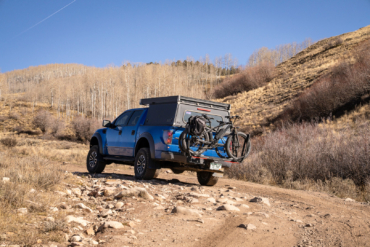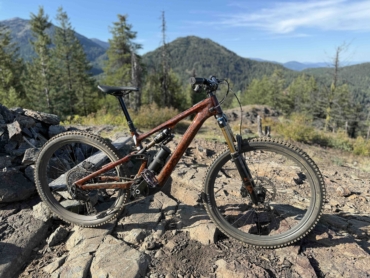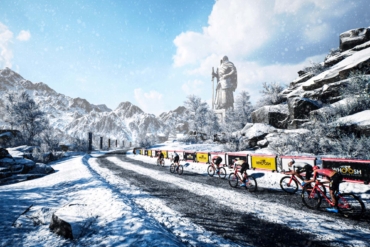The Revel Rodeo is in a category of one, through and through.
It’s the first-ever bike with a fully 3D-printed carbon fiber downhill frame that’s viable. The result of what the brand calls a “passion project,” the one-off concept sucked up some research and design resources on its way to existence.
It’s also a looker.

“While purely a concept bike and not currently for sale, the Rodeo exists as a groundbreaking example of what is possible with modern additive manufacturing,” the company said in a press release.
With time, Revel is convinced the manufacturing and materials choices it used for the bike could change the carbon bike landscape. Costs may be high now, but at scale, 3D printing with fiber using thermoplastic bonding agents could be more efficient and environment-friendly.
How the Rodeo Became Reality
The Rodeo’s synthesis came from a collaboration between pros in multiple industries. Revel Bikes Senior Engineer Jordan Haffener worked alongside the inventor of CBF suspension and experienced 3D printing manufacturer Arevo Inc. to get the job done.
And when I say experienced, I mean experienced. Arevo Inc. brought the world some of its first-ever 3D-printed composite bikes several years ago.
Revel realized that a 3D-printed full-suspension MTB frame in carbon was possible thanks to an earlier collaboration with FusionFiber. Revel RW30 wheels onboarded the forward-thinking carbon technology in 2020. In rudiment, FusionFiber looks to cut down on steps and subtract energy consumption from the traditional carbon fiber manufacturing process.
Most carbon (or composite) bikes use thermoset as a bonding agent. The epoxy is time-consuming to work with, and it makes the resulting material all but unrecyclable. FusionFiber is a thermoplastic, which means recycling bikes made with it could be viable in the future. And because FusionFiber automates multiple fabrication processes, it’s faster to work with, and less hazardous to anyone working with it.
The epoxy-less material helped Haffener and the Rodeo’s design team sync up with Arevo Inc.’s additive manufacturing processes. After “dozens” of prototypes, they finally landed on a winner and the Rodeo was born.
Production Outlook
The Rodeo won’t hit shelves, and its production descendants likely won’t for quite some time. But Revel still wanted to produce a tough unit that could hold its own on rides. That’s because it thinks the potential efficiency of the manufacturing could lead others to adopt it on a large scale.

“Designing a downhill bike is one of the most ambitious undertakings for any brand because they experience abuse unlike any other, from massive drops, high-speed G-outs, and lateral stress from aggressive cornering; they demand durability and reliability to withstand seasons of riding,” the brand said in the press release.
“It’s hard not to get excited about the prospect of a 3D-printed carbon bike made here in the United States. And the ramifications could mean incredibly improved prototyping and development processes for bike brands, safer conditions in production facilities, significant environmental benefits, and greater customization for the rider at better costs.”
Technology and implementation both need to catch up before Revel can bring the masses the Rodeo (or something like it). But as wider adoption occurs, that possibility “becomes very real,” the company said. That’s partly the case because it stands the chance to lower the threshold for early-stage bike companies looking to stand out with new designs.
And far from sequestering the technology for its own advantage, the company would like to see it spread.
“Our engineering team can model up a bike in Solidworks, send it to the printer, and have a fully functional carbon prototype in a matter of days. This is also much less costly, and generally faster, than many alloy prototype bikes, so it could help smaller companies out even more,” Revel Founder and CEO Adam Miller said in an email.
“Iterations and ideas suddenly become cheaper to try out, which automatically leads to more innovation and better bikes. Business does get in the way of bikes sometimes, and my goal here would be to remove as many barriers as possible to getting creative and coming up with the coolest ideas we can for bikes like the Rodeo.”
Ride ’em, cowboys.








